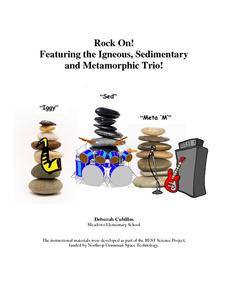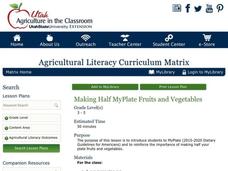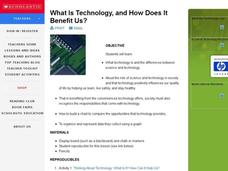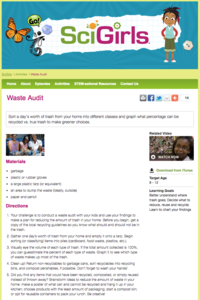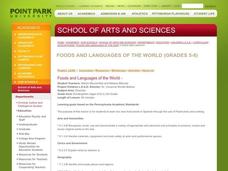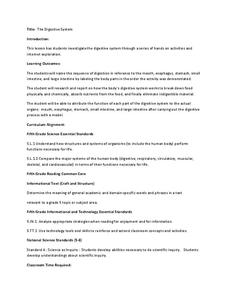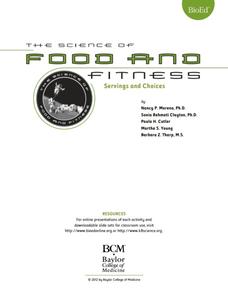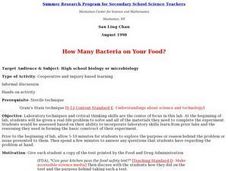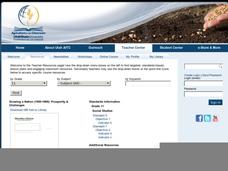Mascil Project
Molecular Gastronomy - Science in the Kitchen
Some say cooking is an art—and a science! Scholars scope out the savory subject of molecular gastronomy with a series of related activities. The teacher's guide contains printable worksheets and helpful tips for implementing the lesson.
University of Georgia
Energy Content of Foods
Why do athletes load up on carbohydrates the evening before a competition? The lesson helps answer this question as it relates the type of food to the amount of energy it contains. After a discussion, scholars perform an experiment...
Curated OER
High-Tech Food: Science in Your Shopping Cart
Kids are given a lot to think about, as they delve into the world of high-tech foods. They discuss GMOs, biotechnology, food enhancements and domestication. They view videos, engage in class discussions, complete worksheets, and learn...
Curated OER
Food for Spaceflight
When astronauts get hungry in outer space, they can't just call and have a pizza delivered. In order to gain an appreciation for the challenges associated with space travel, young learners are given the task of selecting,...
NASA
Food For Thought
Science can be quite tasty. A delectable unit from NASA shows learners why it's important to consider food, nutrition, and health in space. Four lessons explore the idea in great depth, including testing cookie recipes. Along the way,...
California Academy of Science
Sustainable Food Solutions: Weighing the Pros and Cons
A growing demand for sustainable food systems comes from schools and even some cities. So what are some solutions? Scholars consider four different ways to approach sustainable food solutions and list the pros and cons of each. The fifth...
Curated OER
Exploring Living Science Careers
Use a variety of group activities to explore living science careers. Living science careers include everything from a food scientist or farmer to a veterinarian or agricultural economist. Kids will discuss 31 different careers in this...
Curated OER
Rock On! Featuring the Igneous, Sedimentary and Metamorphic Trio!
Get your classroom rocking with this four-lesson earth science unit. Through a series of shared reading activities and hands-on investigations, young geologists learn about the three types of rocks and the unique properties of each.
Agriculture in the Classroom
Making Half MyPlate Fruits and Vegetables
Establish healthy eating habits with a lesson focused around MyPlate's food recommendations and the importance of eating fruits and vegetables. Through class discussion and worksheet completion, scholars discuss the best choices of foods...
Curated OER
What Is Technology, and How Does It Benefit Us?
Students examine and define what technology is as well as the differences between science and technology. They assess the role of science and technology in society, conveniences technology offers and create a chart to compare the...
Curated OER
Food Chains and Food Webs
Fourth graders investigate food chains. In this living environment instructional activity, 4th graders begin to understand the interdependence of organisms. Students describe the connections organisms have to the ecosystem. Students...
Curated OER
Windmills and Blogs: The Impact of Technology in Rural Peru
How does technology affect a community? Research the benefits and consequences of technology in rural Peru. In this technology lesson, learners discuss how the effects of technology. They view a PowerPoint and learn about the Peace...
NOAA
Through Robot Eyes
How do robots assist ocean explorers in collecting data and images? The final installment in a five-part series has science scholars examine underwater images collected by robots and identify the organisms shown. Groups then calculate...
Curated OER
Ethical Ways to Acquire and Distribute Fish as a Food Source
Students complete a variety of activities as they examine the ethics of acquiring and distributing fish as a food source. They touch on the ethics involved in genetically modified salmon, as well.
Teach Engineering
Cellular Respiration and Bioremediation
You can breathe easily now that you've found a winning resource. Young biologists learn about the process of cellular respiration, primarily through teacher-led discussion and instruction. They also consider the concept of...
Alabama Learning Exchange
Make a Difference!
We are very dependent upon other life forms around us to survive. Here, scholars explore relationships in the ecosystem with the help of Auntie Litter and the pollution patrol. They imagine a world without grass, making connections to...
PBS
Waste Audit
Does everything in the trash can belong there? Conduct a waste audit with your class by collecting a day's worth of garbage, separating it into recyclables, non-recyclables, or food waste, and properly distributing what they find into...
Curated OER
Foods and Languages of the World
Young scholars review Mexico's location and language and learn to pronouns 10 new Spanish food words. Students listen as the book, Corn is Maize is read, touching and passing around an ear of Indian corn. Young scholars discuss the...
Curated OER
The Digestive System
Discover how the human body's digestive system works with a brain and stomach friendly activity. Scholars taste test a variety of foods to find out how they behave once in the mouth. Class members then play a game called Move That...
Baylor College
Servings and Choices
An important part of balancing caloric intake to energy expenditure is knowing how many Calories you are consuming. In the fifth of a seven-lesson series on food and energy, learners estimate their daily caloric intake, then use a...
American Chemical Society
Man and Materials Through History
From the start of the Industrial Revolution, it only took 147 years for someone to invent plastic. This may seem like a long time, but in the history of inventing or discovering new materials, this is incredibly fast. An informative and...
Curated OER
How Many Bacteria on Your Food?
High schoolers discuss and conduct a food safety experiment which looks at bacteria and food poisoning. They swab the other area of some food and grow bacteria in an agar plate.
Agriculture in the Classroom
Growing a Nation (1950-1969): Prosperity & Challenges: The Story of American Agriculture
A wonderful lesson on the development and impact of mechanized farming! History or agriculture classes learn the historical background of the United States' food production by creating a pamphlet with information on the cause and...
Kenan Fellows
Sustainability: Learning for a Lifetime – The Importance of Water
Water is essential for life—and understanding the importance of clean drinking water is essential in understanding sustainability! Show your environmental science class the basics of water testing and treatment through a week-long...







